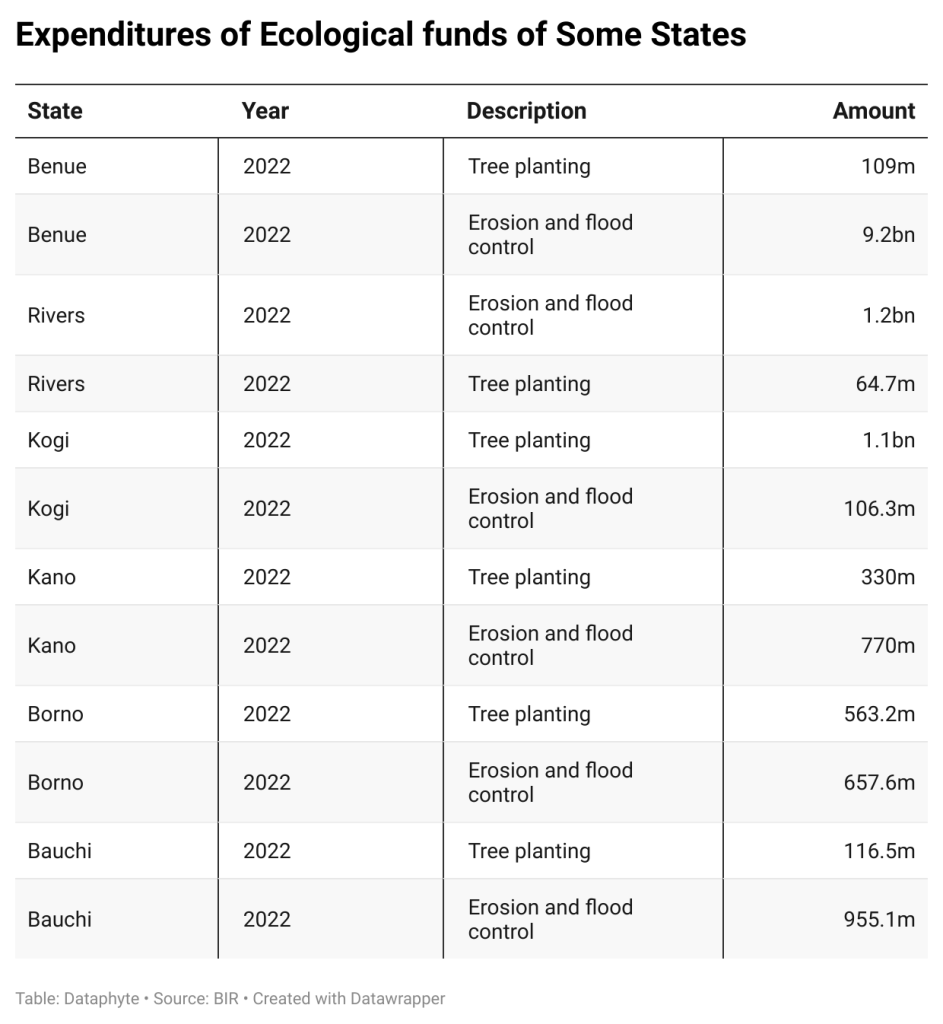Ecological fund is financed from 2.3 percent monthly accruals derived from the federation account. The fund is often used to finance projects that will ameliorate environmental problems nationwide.
Environmental problems are often caused by climate change resulting from shifts in precipitation patterns. Climate change causes unpredictable floods, long-lasting droughts, rising sea levels, erosion, risks to infrastructure, increased ocean acidity, heat waves, among others.
Ravaging flooding in some parts of the country has resulted in loss of lives and destruction of properties worth billions of naira. This has ridiculed the country’s ecological fund, which is failing to halt the disastrous consequences of flooding. Based on weather predictions, this year will, once again, expose that states are still not utilising their ecological funds to forestall environmental disasters and deaths.
States most impacted by floods
The October 2022 floods affected nearly all states in the country, including Anambra, Delta, Kogi, Rivers, Benue, Yobe and Cross River. Other states that were affected included: Bayelsa, Kebbi, Niger, Ekiti, Ogun, Edo, and Imo, Enugu, Nasarawa, Abia, Taraba, among others. Last year’s flooding led to the deaths of more than 600 people, displaced 1.4 million residents while destroying 89,348 houses and 70,566 hectares of farmland and crops.
This raises the question as to why investigating agencies are not tracking ecological funds handed out to Nigeria’s subnationals. All 36 states, including the FCT in Nigeria, in 2021 and 2022, received N64 billion as ecological funds, with Kano getting the highest amount.
Among the states most impacted by flooding in October 2022, Kano received the highest amount of N3.1 billion, followed by Borno, which got N2.46 billion. Bayelsa and Kebbi both received N1.20 billion, the lowest by states most impacted by flooding.

Key ecological operations embarked upon by states are erosion management, flooding, and tree planting. As part of the Paris Agreement 2015, tree planting is often deployed to meet the nationally determined contributions (NDC) target and arrest greenhouse gasses (GHG).
This is done by using the photosynthesis process by trees to reduce the carbon dioxide in the atmosphere. There has been increased funding for tree planting in recent times. World Resources Institute (WRI), One Tree Planted (OTP), and Realize Impact granted up to $500,000 to firms planting trees in 2021. Multinationals such as Lafarge Africa and Seplat have also supported tree planting initiatives in recent times in Nigeria.

Accountability and Transparency of ecological funds
Nigeria’s flooding cases in October 2022 raised questions as to where ecological funds often went to.
The Socio-Economic Rights and Accountability Project (SERAP) raised questions around ecological funds’ accountability after the 2022 flooding incidents.
The House of Representatives, in the same period, also called for the investigation of remittances to the Ecological Fund and withdrawals from the account between 2010 and 2022, alleging mismanagement by beneficiaries.
Nigerian states receive ecological funds but do nothing to forestall flooding. Analysts believe the funds are either unutlised or diverted.
Director of Waterwide, which specialises in water and hygiene, Mr Wilson Atumeyi, said, “Nigeria has an accountability deficit, raising concerns about the utilisation of ecological funds.”
He noted that it was impossible to establish how the money was used, making it difficult to assess whether it sufficiently addressed ecological issues or not.
“Ecological funding might not be a cure-all for environmental issues, but it does represent a significant advancement in our shared quest for a resilient and sustainable future.” said an environmentalist and researcher, Adesuwa James Jang. She added that the fund’s management must be open, honest, and accountable, focusing on evidence-based decision-making if it was to have the greatest possible impact.
According to Climate Action Tracker (CAT), Nigeria’s transparency framework has much room for improvement. The lack of transparency restricts the country’s ability to keep track of climate finance and mitigation initiatives. This demonstrates even more clearly the necessity for ecological finance to be transparent and accountable, say analysts.
There have also been predictions of flooding in Nigeria in 2023. According to the National Emergency management Agency (NEMA), there will likely be significant flooding in 178 local governments across 32 states, including the FCT, in 2023.
“Nigerian states must understand that if they are not accounting for ecoological funds, donors and supporters will be reluctant to provide succour next time it is needed,” said Ike Ibeabuchi, an amerging markets analyst.
This report was produced in fulfilment of the UNESCO & CIJ London Climate Change in News Media Project facilitated by the Centre for Journalism Innovation and Development.

.webp)


